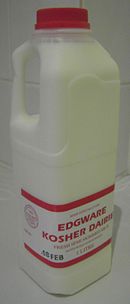- Cholov Yisroel
-
Cholov Yisroel (Hebrew: חלב ישראל) refers to all dairy products, including cheese and non-fat dry milk powder, which have been produced under the supervision of a Rabbi.
Under Jewish halachic law, milk is kosher only if it comes from a kosher species of animal (such as cows and sheep) and milk from a non-kosher species (such as horses, and camels) is forbidden.
In the past it was not uncommon for farmers to mix the milk of their various herds together, unbeknownst to their customers. Since it was conceivable to have a farm selling a mixture of Kosher and non-Kosher milk, Rabbis issued an injunction against the use of milk from a non-Jewish farmer; such milk is referred to as chalav akum. The restriction did not apply if there was supervision of the milking process by a Jew until the milk was sold. The milk itself is automatically kosher (so long as it is 100% from a kosher animal, namely, a cow, sheep, goat, or other kosher mammal) but the Rabbis' decree served to protect people from potential dairy deception.
The first Cholov Yisroel dairy farm on the East Coast, and possibly in the United States, was started by Isaac Balsam in 1903, and remained in business until 1955.
In the USA and other countries similar regulations
Nowadays, modern health standards (regulated by health organizations, such as the USDA) are intended to make sure that milk sold in stores labeled as "cows' milk" is 100% cows' milk. Therefore, many prominent Orthodox rabbinical authorities, all basing their subsequent decisions on the ruling of Rav Moshe Feinstein, permit the use of regular cows' milk in the United States and other countries with similar regulations[citation needed] when Cholov Yisroel is either not available or priced significantly higher. This is sometimes referred to as cholov stam, meaning "plain milk". On the other hand, many prominent Orthodox Rabbis actually forbid the use of milk that is not cholov yisroel under any circumstance as violation of a rabbinical prohibition[citation needed]. It was reasoned that if you lived in a remote area, with no real practical way to obtain cholov yisroel milk, and if you needed to consume it for health purposes, then one could reason that "cholov stam" is okay to drink. Today, many rely on this ruling as a way to drink non-cholov yisroel milk and consume cholov stam products (such as M&M candies) that are not required for health purposes. Being that there are varying opinions regarding if and when one is permitted to drink "cholov stam", a competent Rabbi should be consulted.
All dairy products made in the USA or countries where people eat "cholov stam", even when bearing a Kosher symbol, are most likely to be "cholov stam". Kosher certifications in such countries usually mark "cholov yisroel" in either English or Hebrew next to their kosher symbol. However, all products certified by the Star-K are Cholov Yisroel. Kosher certification In Israel, kosher certifiers don’t usually mark “cholov yisroel” since it is the standard there--in fact, kosher dairy products in Israel that are not Cholov Yisroel need to be marked as such.
According to many views, Jews who wish to strive for a stricter observance of Jewish law will only consume dairy products that are supervised by a mashgiach and are certified with the label: "Cholov Yisroel". The retention of the Cholov Yisroel system is also related to the retention of traditions/customs, a central part of Judaism. Kabalistic reasons are also given for being strict concerning cholov yisroel; these are not based on the possibility of mixing non-kosher milk but on spiritual ramifications to drinking non-cholov yisroel[citation needed].
References
Kashrus Kurrents, Cholov Yisroel: Does a Neshama Good by Rabbi Moshe Heinemann, Star-K Rabbinic Administrator [1]
See also
Principles Kosher meat Kosher foods Kashrut certifying agencies Badatz · BC Kosher · Central Rabbinical Congress · Chicago Rabbinical Council · COR · EarthKosher Kosher Certification · Edah HaChareidis · Kashruth Council of Canada · Kosher Supervision of America · London Beth Din · OK Kosher Certification · Orthodox Union · Rabbinical Council of California · Star-K · Tav HaYosher · Triangle Krelated Categories:- Hebrew words and phrases
- Kosher food
Wikimedia Foundation. 2010.

